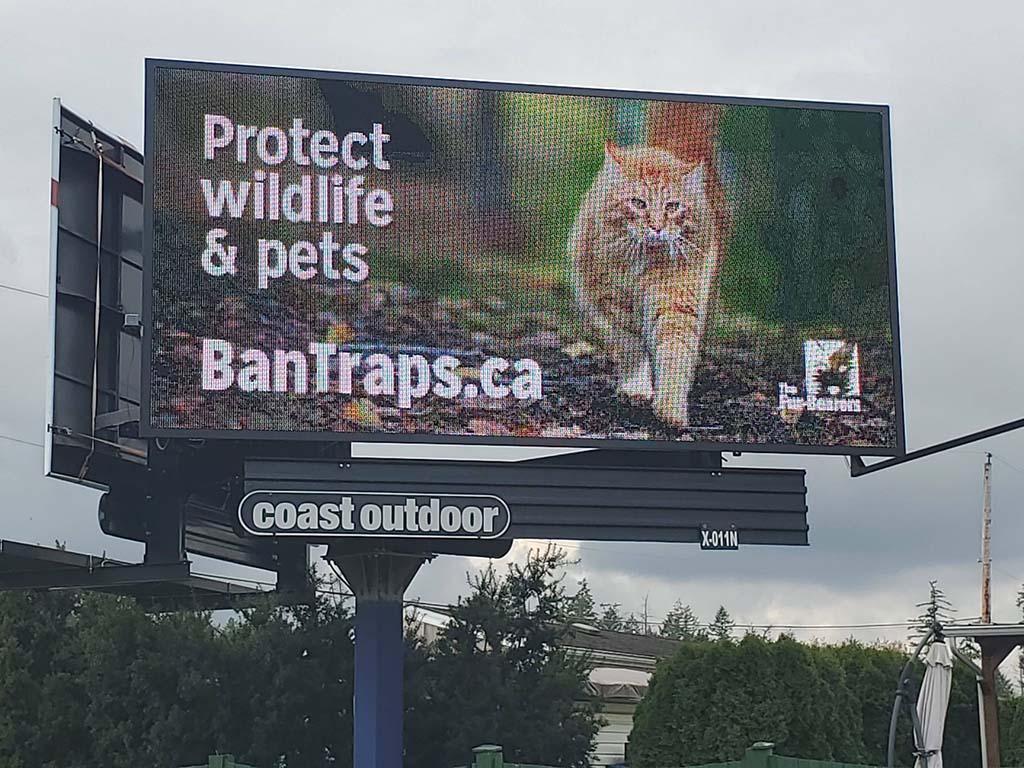The Fur-Bearers, a Canadian wildlife advocacy group founded in1953, has funded three rotating messages on digital billboards on the Patricia Bay Highway (near Mt. Newton Cross Road) in Victoria.
One of the photos is of a B.C. raccoon, who was caught and “degloved” earlier this year by a trap considered “humane” by the provincial government. The raccoon, a mother who was still caring for her young kits, dragged the trap for several days, in constant pain, before she could be caught by volunteers. The extent of her devastating injury made humane euthanasia by a veterinarian the only option – her kits were taken by volunteers to a wildlife rehabilitation centre, where they will be raised and released when appropriate.
“The government of British Columbia is aware that an average of eight dogs and cats are killed or maimed by these traps annually, that multiple municipalities have attempted to create bylaws to restrict their use, and that wildlife rehabilitators are treating dozens of cases of tormented wildlife every year, yet have done virtually nothing to make British Columbia’s supernatural spaces safe for all,” says Lesley Fox, Executive Director of The Fur-Bearers. “For several years, The Fur-Bearers and other stakeholders have requested common-sense changes to legislation, such as requiring signage or increase setbacks from publicly accessible trails when traps are in use, all of which have been ‘active files’ with no progression. Residents need to know the risks and consequences their legislators are willing to take with the safety of their constituents, their families and pets, and native wildlife.”
“It is unthinkable that your best friend could be caught and killed in a steel trap before your eyes, in your own community,” Fox says. “But that’s the reality for far too many families. It’s time for British Columbia to do better.”

“Many people don’t know that traps are legal,” says Fox “or there is a misconception that traps are a northern issue.” She says we need a larger narrative about trapping as a modern day concept. Wildlife is not only trapped for fur but as “nuisance” animals. For example, traps can be set anywhere in the province by individuals who hire themselves out as contractors. Their clients are farmers, government agencies, and property owners. Provincial regulations dictate that traps can be set within 200 metres of a building, with no requirement for signage to alert the public.
“We want to see mandatory signage for traps wherever they’re set.” says Fox.
The use of steel jaw leghold traps was banned in Canada, leading many to believe that trapping was banned. Although the European Union did pass a ban in 1995 on leghold traps in all its member countries, most are unaware that Canada, Russia and the USA threatened the EU with economic penalty. The “Agreement on International Humane Trapping Standards” was drawn up, which has little to do with animal welfare. You can read an outline about AIHTS here and you can find Canada’s position on the document here.
While the trapping industry attempts to assuage their public image with assurances of more efficient, kinder traps they are missing the mark of a changing society. They, and the governments that currently support them, are ignoring the very real pain of Canadians who have lost pets. They are ignoring Canadians who are growing ever more aware of the inevitable “unintended victims,” such as a plethora of non-target animals and endangered species.

The province has stymied municipal governments’ attempts to ban trapping within their own jurisdictions, tone deaf to regional action as in the case of Nanaimo, which banned the use of animal traps in 2013, and this year were told by the province that the ban isn’t going to be considered any time soon.
The signs, which include images of the mother raccoon and her injury, as well as a dog and a cat, encourage residents to visit BanTraps.ca to learn the truth about trapping, how to release their pets from traps and how they can make a difference in creating a safer British Columbia for all.
Kelly Carson
Victoria Animal News
 Victoria Animal News Animal news for Victoria and across B.C.
Victoria Animal News Animal news for Victoria and across B.C.



